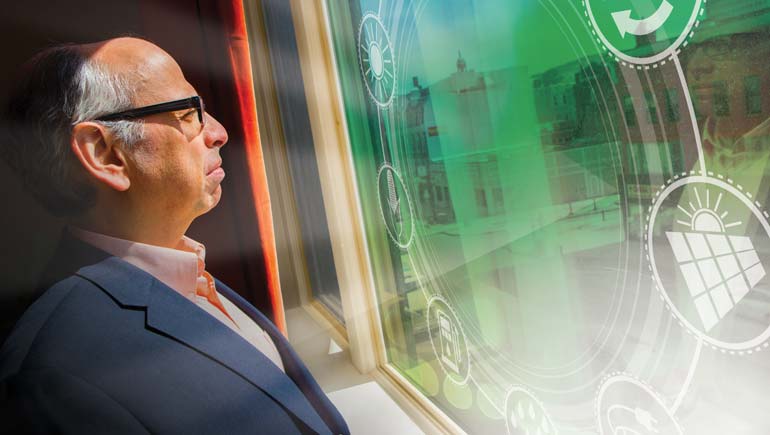Creating sustainable communities
Master's program produces leaders, advocates

This fall will mark four years since Binghamton University admitted its inaugural class into the sustainable communities master’s program, the first graduate degree of its kind to be offered in the State University of New York system and one of only a select number of programs at Binghamton shared between two colleges.
“Sustainable communities is an interdisciplinary degree,” says George Homsy, program director and associate professor of public administration. “Because the program draws so heavily on students being able to tap into different professional skills and knowledge bases, there was an agreement that this would be a program that sits in both Harpur College of Arts and Sciences and the College of Community and Public Affairs.”
Students enrolled in the program are able to earn either a master of science or a master of arts degree with the requirement that they complete a minimum of two elective courses that relate to their area of interest.
“One of the challenges with sustainability is that it’s such a large umbrella,” Homsy says. “I expect graduates of the program to be able to think systematically about issues and see interconnections.”
Some of the topics that students want to research and be able to offer solutions for include climate change, food security, energy policy and community resilience.
“These are the issues that really interest students,” Homsy says. “Many will go on to create and shape the policies and priorities that need to be put into place to create sustainable communities. They secure the funding and other resources needed to make change happen.
“That is our goal — to have students think holistically about the implications, and about how we can change the world environmentally, socially and economically to make it better for everyone.”
A unique feature of the program is that all students attend a weekly colloquium at which working professionals are invited to speak.
Annisia Perry, MA ’20, speaks highly of the regularly scheduled colloquia.
“I love that in colloquium we have people in different fields talk about what they do in their day-to-day lives and current positions,” Perry says. “Sometimes you have to actually work in a specific position or field to get an understanding of what that job truly is like — but with colloquium it bridges that gap by allowing us to hear about all the different experiences.”
Homsy strategically schedules each guest speaker to return to campus every other year so current students never hear from the same speaker twice. Past guests have included the New York City green infrastructure project manager, a senior manager at Southern California Edison, Wegmans’ sustainability director, Binghamton’s city planner responsible for historic preservation, an expert on financing New York City affordable housing projects and Broome County’s resilience planner.
The program requires graduating students to submit a traditional thesis or complete a capstone project. As a result of their widespread interests, each year the program is presented with a variety of different findings from students on environmental, economic and social justice issues.
Perry, who entered the program in 2018, spent her final semester in New York City as a paid consultant in the Sustainability Programs Department at the New York City Housing Authority (NYCHA).
“The NYCHA 2.0 Waste Management Plan was released in 2019 as part of the citywide effort to send zero waste to landfills by 2030,” Perry says. “The plan [aims] to improve recycling, reduce pests and improve the overall cleanliness of NYCHA developments. The specific initiative I worked on involved NYCHA installing in-sink food disposals into three of their developments to stop food from going into the garbage and to reduce pests.”
Perry interviewed residents of the housing developments on their experience with the disposal systems and their success diverting food waste from the trash. She reported her findings in real time back to her department, and the data informed the rollout of the broader initiative.
Perry credits her coursework for preparing her to be successful with her work with NYCHA: “One required class that definitely helped me was Research Methods, where we learned how to conduct interviews and surveys, and how to analyze both qualitative and quantitative data.”
Perry plans to stay in New York following graduation and hopes to pursue a career where she will continue to fight for zero waste in the city by 2030 and remain actively involved in changing the way residents of her community think of sustainability.
“Annisia’s capstone really combines the social and environmental aspects of sustainability by better understanding [city] public housing residents’ impact on how much garbage goes in landfills and finding ways to reduce that. Other graduating students have done really important work in different areas,” Homsy says.
He cites one student who researched food gentrification and how farmers’ markets and urban farms are delivering on their mission of getting food into the hands of those who need it. Another student is analyzing the policies used in farm-to-school programs in New York state and, if they’re not working, identifying what changes should be made.
When asked where recent alumni are today, Homsy shared job placements in a variety of government, non-profit and private sectors.
“We have one graduate who is a solid waste management consultant, another who is here at the University working on a living building project, another is back in their home country working as a diversity and inclusion consultant, and I can think of another who is focusing on energy issues and employed at a non-profit sustainability coalition,” Homsy says.
Only four years old, the Sustainable Communities program is producing graduates who can think broadly about sustainability management issues and are ready to become leaders and advocates of the planet.
